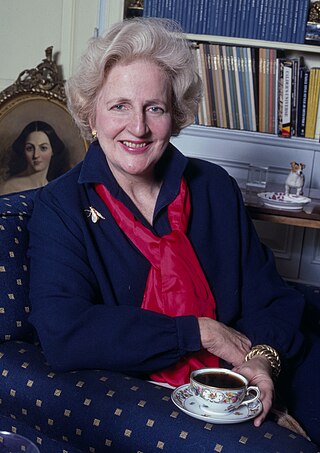
Etiquette is the set of norms of personal behaviour in polite society, usually occurring in the form of an ethical code of the expected and accepted social behaviours that accord with the conventions and norms observed and practised by a society, a social class, or a social group. In modern English usage, the French word étiquette dates from the year 1750.
Ms. or Ms is an English-language honorific used with the last name or full name of a woman, intended as a default form of address for women regardless of marital status. Like Miss and Mrs., the term Ms. has its origins in the female English title once used for all women, Mistress. It originated in the 17th century and was revived into mainstream usage in the 20th century. In the UK, Ireland and the majority of Commonwealth countries, a full stop is usually not used with the title; in Canada and the United States a full stop is usually used.

Judith Martin, better known by the pen name Miss Manners, is an American columnist, author, and etiquette authority.

A visiting card or a calling card, was a small, decorative card that was carried by individuals to present themselves to others. It was a common practice in the 18th and 19th century, particularly among the upper classes, to leave a visiting card when calling on someone.

Emily Post was an American author, novelist, and socialite, famous for writing about etiquette.

Town & Country, formerly the Home Journal and The National Press, is a monthly American lifestyle magazine. It is the oldest continually published general interest magazine in the United States.
Adab in the context of behavior, refers to prescribed Islamic etiquette: "refinement, good manners, morals, decorum, decency, humaneness". Al-Adab has been defined as "decency, morals".
Anthony John Morgan was an English writer and expert on etiquette.

Table manners are the rules of etiquette used while eating, which may also include the use of utensils. Different cultures observe different rules for table manners. Each family or group sets its own standards for how strictly these rules are to be followed.
The Dutch have a code of etiquette which governs social behaviour and is considered important. Because of the international position of the Netherlands, many books have been written on the subject. Some customs may not be true in all regions and they are never absolute. In addition to those specific to the Dutch, many general points of European etiquette apply to the Dutch as well.

Etiquette in Asia varies from country to country even though certain actions may seem to be common. No article on the rules of etiquette, nor any list of faux pas, can ever be complete. As the perception of behaviors and actions vary, intercultural competence is essential. A lack of knowledge about the customs and expectations of Asian people can make even those with good intentions seem rude, foolish, and disrespectful.
Etiquette rules in the United States and Canada generally apply to all individuals, unlike cultures with more formal class structures, such as those with nobility and royalty.

Letitia "Tish" Baldrige was an American etiquette expert, public relations executive and author who was most famous for serving as Jacqueline Kennedy's Social Secretary.
Work etiquette is a code that governs the expectations of social behavior in a workplace. This code is put in place to "respect and protect time, people, and processes." There is no universal agreement about a standard work etiquette, which may vary from one environment to another. Work etiquette includes a wide range of aspects such as body language, good behavior, appropriate use of technology, etc. Part of office etiquette is working well with others and communicating effectively.
A courtesy book was a didactic manual of knowledge for courtiers to handle matters of etiquette, socially acceptable behaviour, and personal morals, with an especial emphasis upon life in a royal court; the genre of courtesy literature dates from the 13th century.
The ton was the high society in the United Kingdom during the late Regency era and the reign of King George IV, and later. The word means, in this context, "manners" or "style" and is pronounced as in French. The full phrase is le bon ton, meaning etiquette, "good manners" or "good form" – characteristics held as ideal by the British beau monde.
Etiquette in technology, colloquially referred to as netiquette is a term used to refer to the unofficial code of policies that encourage good behavior on the Internet which is used to regulate respect and polite behavior on social media platforms, online chatting sites, web forums, and other online engagement websites. The rules of etiquette that apply when communicating over the Internet are different from these applied when communicating in person or by audio or photographic phone. It is a social code that is used in all places where one can interact with other human beings via the Internet, including text messaging, email, online games, Internet forums, chat rooms, and many more. Although social etiquette in real life is ingrained into our social life, netiquette is a fairly recent concept.
Galateo: The Rules of Polite Behavior by Florentine Giovanni Della Casa (1503–56) was published in Venice in 1558. A guide to what one should do and avoid in ordinary social life, this courtesy book of the Renaissance explores subjects such as dress, table manners, and conversation. It became so popular that the title, which refers to the name of one of the author’s distinguished friends, entered into the Italian language as a general term for social etiquette.
Lizzie Post is an American writer whose opinion on evolving changes in modern manners is frequently cited.
Daniel Post Senning is an American etiquette expert. He is the co-president of the Emily Post Institute, founded by his great-great-grandmother Emily Post.








